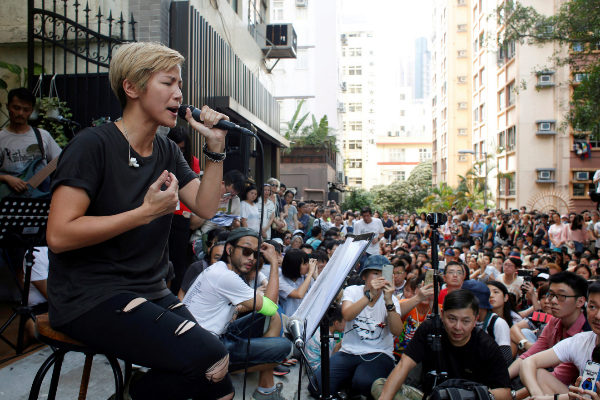- Asia: Another huge opposition demonstration in Hong Kong redoubled the challenge to Beijing
- Protests: The Hong Kong crisis divides its population: "Protesters are beasts, terrorists"
- Hong Kong: The political crisis triggers an "economic tsunami" in Hong Kong
Until August 2014, Denise Ho was baptized as the new 'Queen of Cantonese Pop' by the same Chinese media, which weeks later included her on a blacklist. Her mutation, from artistic icon to banned figure, occurred as soon as the singer joined the protests of the Umbrella Revolution in the fall of 2014.
The family of the interpreter, 42, was one of many who left Hong Kong in the direction of Canada before the return of the metropolis to Chinese sovereignty in 1997. However, Ho returned to his hometown and there became Outstanding disciple of Anita Mui, an emblematic figure of Cantonese music.
In 2012, taking advantage of Hong Kong's LGTBI Pride day, Denise acknowledged that she was part of this community and, from that moment on, became an active defender of collective rights.
It was then that he suffered the first vetoes to his artistic career, which multiplied when he joined political activism. "You have won a handful of money and then turn your back and criticize your homeland," the Xinhua agency wrote in a commentary on those dates in which it certified the ostracism of the singers and actors who spoke in favor of the revolt.
Now, Ho has rejoined the ranks of young people protesting the expansion of Chinese influence in Hong Kong for weeks. "They say that I am part of the leadership, I am among the 'inciters' and I am also in charge of the 'funds'," he said between smiles this Sunday, while preparing to attend the massive popular mobilization that was recorded that day.
Are you worried about the future of Hong Kong? Yes, of course, I am very worried. During these past 22 years we have seen how all the promises made by the Chinese Government have not been respected. Now they have used all possible tactics to control us: the brutality of the police, the absence of government response, the sending of troops to Shenzhen to try to scare us, the allusion to the Tiananmen massacre ... They always play with fear to divide us . What do you think about the violent actions of opponents? What did you think of the assault on the parliament or the incidents at the airport? To understand what happened at the airport you have to understand the impact that the appearance of 'provocative agents' have had, which are police officers dressed as protesters. This last circumstance has generated many doubts in a movement whose strength was based on collective unity. Now we don't know who the friend is and who the enemy is. Until they appeared they had not generated this type of altercations. Have these aggressive actions had an impact on the revolt? Some democratic leaders already speak of two tendencies, one that defends a peaceful resistance and a minority of radicals. Yes, it has had repercussions. Trust has suffered. There are many people among those who defend civil disobedience that we are worried about. I have received many messages telling me: "Please tell them to stop the violence!" But I am not their leader; This is a movement without leaders. We are learning, for us this is something very new. It had not happened until 2014. Maybe we have to prepare ourselves to assume that these protests are not the end of anything but one more step in our fight for freedom. But those of us who defend the peaceful way remain the majority. How do you see the future of the revolt? It is very easy to feel discouraged in the short term, but we have to be attentive to our surroundings. There are many elements on the international scene that help us: the US and Chinese trade war, the possibility of the approval of the Hong Kong Human Rights and Democracy Act in the US (which may call into question the favorable treatment that the locality receives for the American nation) or the next elections in Taiwan. All of that is a protective shield for Hong Kong. Imagine what the Taiwanese will think if China sends troops to Hong Kong! In addition, the economy of Hong Kong remains very important for China. Foreign investments continue to pass through Hong Kong. And the economy (of the town) is suffering. That is what most worries the local government. The crisis has also caused a split in the entertainment sector. Characters such as actor Jackie Chan - native of the city - or Liu Yifei, the protagonist of the Disney production 'Mulán', have spoken in favor of the Beijing Government. Others, like you, your professional partner Anthony Wong Yiu-ming or actress Deanie Ip have lined up on the side of the opponents. Has the attitude of those who criticized the protesters surprised you? No, but it does cause me great sadness and I am disappointed to see that people who are supposed to be creative crouch before those who suppress the voices of the people. It is true that there has been a lot of pressure on these actors and singers, but they had the option to say something and have turned their backs on the people of Hong Kong. In reality, the entire industry has censored itself and remains silent. I have friends who have separated from me for fear of the political repercussions that a photo would have on my company.According to the criteria of The Trust Project
Know more- Hong Kong
- China
- Asia
AsiaThe Hong Kong crisis divides its population: "Protesters are beasts, terrorists"
Trade war Trump warns China: a Tiananmen in Hong Kong would make a trade agreement very difficult
Asia Another huge opposition demonstration in Hong Kong redoubled the challenge to Beijing

